In honor of the seventieth Martha’s Vineyard Striped Bass and Bluefish Derby, we sent fishing legend Janet Messineo out trolling for fish tales. Then, in honor of the fortieth anniversary of Jaws, we chummed the waters ourselves for a couple of good shark stories. The result? Well, you should have been here that time when, holy crap...you wouldn’t have believed it....
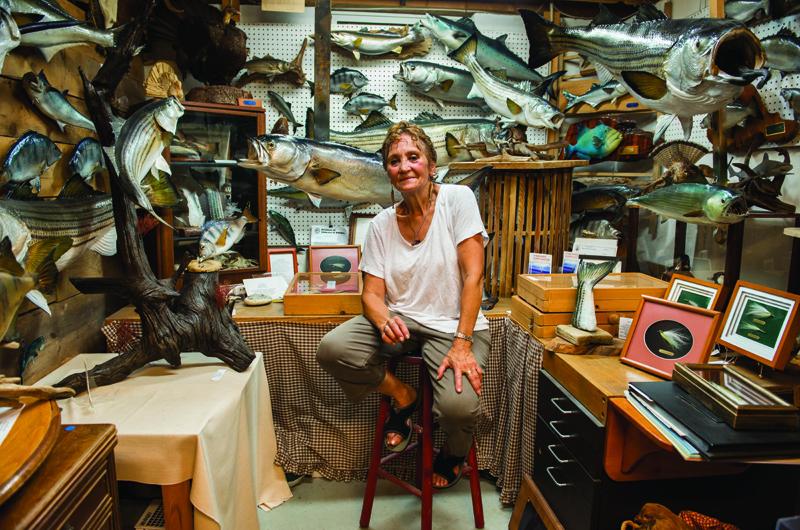
Janet Messineo and the Big One
Tim White and I had been friends since my first summer on the Vineyard in 1966. He was an experienced fisherman and I was just beginning my journey into surfcasting. After much persuading on my part, he invited me to fish with him. Neither of us owned a beach buggy so we did a lot of walking on the rocky north shore. We also fished from bridges and jetties. Mostly through observation, I learned how to catch bait and fish it on the bottom.
Many times, struggling in the dark with my line in a bird’s nest or my reel fouled, Tim would laugh and tell me that he could help me, but the only way I would learn was to work it out myself. At the time, I thought he was being unreasonable, especially when the fish were hitting and he was catching and I couldn’t get my bait in the water.
One such evening we were fishing the boulder-covered shore of Cedar Tree Neck. Just as the sun set, a school of hungry bass chased a pod of squid onto the beach. We looked down at our feet and squid were laying everywhere. Tim quickly showed me what to do: we hooked the live squid and tossed them into the feeding school of bass.
I hooked up, and remember thinking that the biggest striped bass ever had devoured my live-lined squid. The fish took a couple of long runs and then just stopped cold behind a boulder. My heart was pounding out of my chest and my knees were knocking with anticipation. I had read that bass sometimes swim behind rocks and purposely rub the hooks out of their mouths, but hard as I tried to outwit this monster, I could not seem to get it to swim out from behind the boulder.
On Tim’s advice, I opened the bail on my reel to free-spool my line so the fish would think it was free and swim away from its hiding place. It worked: the line peeled off my reel. But then the fish swam behind the same rock and again would not budge. I must have fought this fish for a half an hour before it became clear to me that I had no fish at all. In the darkness I was finally able to figure out that my line was laden down with heavy seaweed and I was indeed fighting a rock. Each time I opened the bail, the weed on my line would rush along with the wind and tide. Once I tightened it up again, it became stuck.
I might have had a fish on my line at some point, but that fish was long gone. By the time I cleaned off the heavy weed and retrieved my frayed and tangled line, the school of fish had vanished.
-Janet Messineo
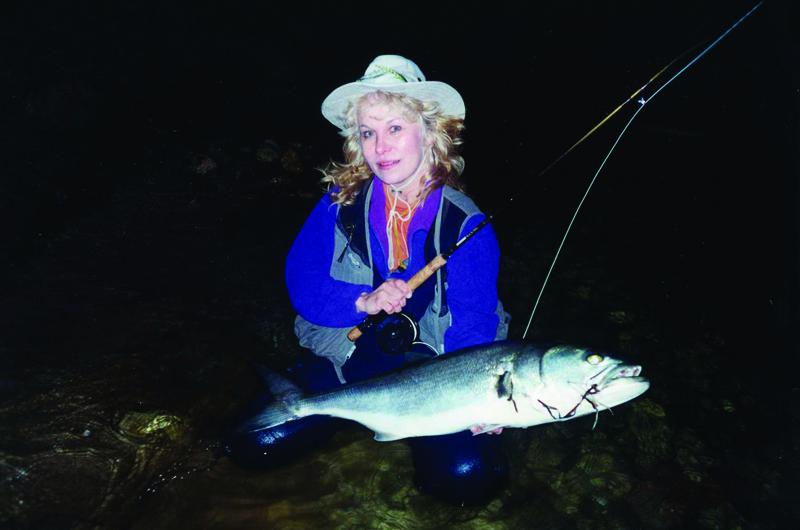
Lori and the Dream Fish
Lori Vanderlaske had been having a recurring dream about catching a fish of a lifetime. She told her husband, Ken, and a few friends about it because the dream was so tangible she wanted it validated if it ever became a reality. Though she now lives in Florida, at the time both she and her husband were guides on the Island for the Orvis company.
In 1995, the fiftieth Martha’s Vineyard Striped Bass and Bluefish Derby was in full swing when, like an old friend, the dream visited her once more. “In the dream I could see myself fishing in a spot that no one would think to go. I arrived there just before sundown and attached a wire leader just in case a bluefish hit my fly. I then tied on a large squid fly.”
In the dream she had been casting the fly into the ocean for about twenty minutes as the sun was getting low when she felt a grab. The fish sped off into the deep water and she saw a large silver body glistening at the end of her line. “Five times I am able to see the unidentifiable silver rocket within ten feet from shore,” she said. But she woke up before she could land it. “Damn!,” she thought. “What’s happening here?”
Two days later, though exhausted, she had an urge to go to the spot in her dream. Something told her it was time to see if there was any truth to what was haunting her night after night.
“My husband laughed at me and said, ‘No one ever catches fish there at this time of year,’” she recalled.
The tide was just beginning to fall and the sun was setting. One, two, three, up to ten times her fly slapped the water. Suddenly, like a flash of lightning, a great silver fish exploded in pursuit of her fly. Her rod bent and the fish was hooked. This mysterious, heavy creature fled for deeper water and the fight ensued.
“Momentarily, I was filled with fear for I began to wonder if I was in ‘the dream’ or was this really happening. Five times the fish ran and five times I was able to get it close to the shore.” She paused. Memories came to her. “My paternal grandfather and my dad taught me to fish, and I always bring their spirits with me. I could hear them in my ear: ‘Just relax, Lori. Don’t horse the fish. You will feel when it’s ready to give up. Don’t give it slack. Breathe.’”
She assumed it was a striped bass until she shined her light on it. Laying on the beach by her feet was a beautiful 18.69-pound bluefish. It was not a dream. It was real. And it not only won the derby’s shore division; it also took a women’s fly rod world record.
-Janet Messineo
The Wild and Crazy Slovakians
Mike Cassidy came to the Vineyard in 1978 to do a big painting job in Katama and saw guys catching stripers on South Beach. That weekend, back home off-Island, he bought a rod at a department store and the following work week caught a thirty-nine pound striper on his first try. Hooked, he moved here in 1980.
One year during the early 1990s, he hosted a few Slovakian chaperones from a student exchange program at the high school. When he served them a striped bass, it made them happy. When he said “let’s catch one,” they were ecstatic, and down to South Beach they went.
Their English was poor, and Mike’s Slovakian nonexistent. But he learned, mostly through pantomime, that their only previous fishing experience was when the officials back home drained a nearby reservoir and people gathered fish from the dry lake bottom. They were having a grand time drinking Slovakian vodka and chatting when suddenly one of the rods bent over in the sand spike with a big fish on the end of the line. Soon they had a thirty-four-inch striper on the beach.
The Slovakians were in awe of this beautiful, huge fish and they all posed for photos with it. But Mike hadn’t explained yet that the legal minimum size for keeping a bass then was thirty-six inches. The fish was two inches short and awe turned to horror as he attempted to release it.
“Not too small; too big, too big,” one of the Slovakians yelled, while another of his guests waded into the surf after Mike and tried to wrestle the fish away from him. “NO, it is too small!” he yelled. “No, too big!” they responded.
The fish agreed with Mike, however, and swam away unharmed. Pantomiming a man in handcuffs, Cassidy finally convinced his new friends that had they kept it they might be arrested. They never got a keeper, however, and Mike thinks that to this day they probably think Americans have big egos about the size of their fish.
-Janet Messineo
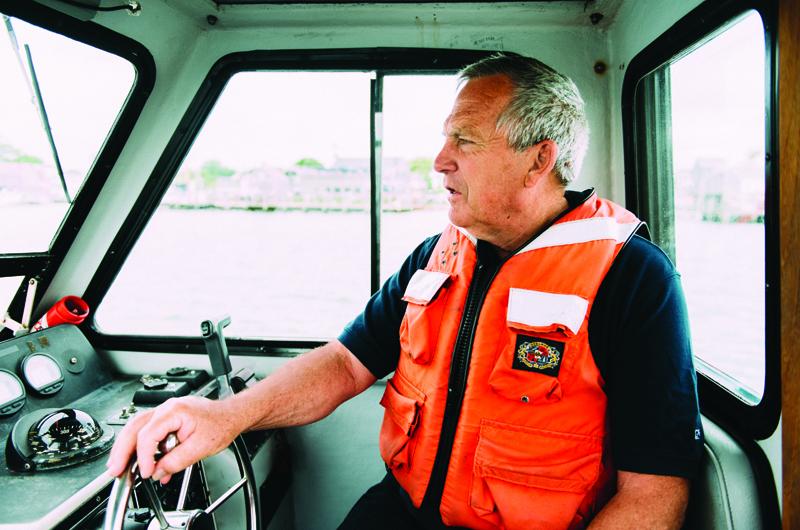
Charlie and the Mako from Hell
Before Charlie Blair became Edgartown harbormaster, he was a charter captain for twenty-five years. Naturally, he’s had countless wild afternoons out fishing, but one of his best stories he kept hush-hush for many years. As he put it, “I always thought it was bad for business talking about the mako jumping into the boat.”
He was out with a party of teenagers on a charter, throwing out chum and setting a few bait traps. “I saw the fin,” he said. “I knew what he was.” Almost immediately, the fish was hooked up. “He was jumping and the reel was screaming,” he said. “I got the young man who was first up ready to go.”
The teenager fought the shark for about a minute, which, Blair said, meant only that he held onto the rod. But then the rod stopped moving and the two watched as the shark did a U-turn and began heading toward them. It leaped out of the water and was going so fast that Blair knew what was coming.
“I screamed and all the kids ran toward the cabin. I went to the kid who was clipped in and literally threw him and the rod forward.” In the nick of time, too, because the 210-pound shark landed right where Blair and the boy had been only seconds before.
“It was pissed off,” said Blair. “It was like half a dozen angry Rottweilers.” Thrashing around in the boat, the shark bit the handle off of a fishing reel and right through a one-inch-thick hydraulic hose that Blair figured would take ten minutes to saw through. “It was chomping its teeth so hard they were literally falling out.”
Blair and his passengers scrambled onto the roof of the cabin and watched the shark wreak havoc below. Blair had a gun but couldn’t shoot the shark for fear of putting a bullet through the hull. When at last he managed to harpoon the mako, he said, “it went nuts and wrapped itself up in the rope like a mummy.” Only then could he get it into a tail rope and haul it toward the edge of the boat.
“Every inch of the boat was covered in blood,” he said. “It was really unbelievable.” And a miracle that no one was hurt, he added. Occasionally some of the passengers who were there on that fateful day still come by and reintroduce themselves to him.
“Those kids,” said Blair, “will never forget it.”
-Nicole Grace Mercier
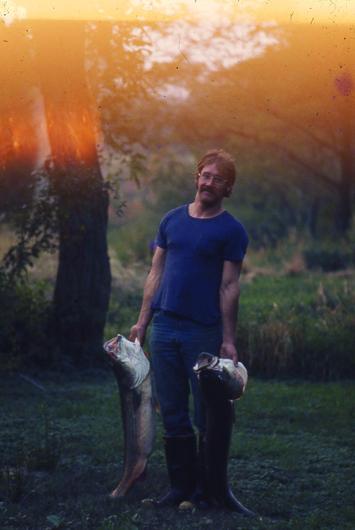
Albert and the Shark
In 1978, I launched my twelve-foot tin boat in the surf at Squibnocket with a newly acquainted friend – I’ll call Jim – for the purpose of rowing to one of my favorite fishing spots. Jim had fished some, but wasn’t real privy with the ocean.
It was early fall and my plan was to fish with live eels, using spinning rods with twenty-pound test line attached to fifty-pound monofilament leaders. There is a field of boulders in about sixty feet of water that was a popular spot for catching large stripers that a handful of my fishing buddies and I knew about. Back in those days, I used landmarks to get my bearings; when the telephone pole by the cabin lined up with the large, white boulder on shore to the north, and the scrub oak on the cliff to the west lined up with the split rock on the beach, I knew that I was in the right spot.
The day was overcast with a gentle northeast wind and the seas were a little choppy, but not too bad and we had a tide that would be full in about two hours, perfect conditions for fishing. But after twenty minutes of rowing my friend appeared nervous.
“Where are we going?” he asked. “I thought we were just going a couple hundred yards off shore.” The farther I rowed the more nervous he appeared, plus the sky was getting darker and the wind was picking up a little.
Once we reached our fishing destination we started drifting our eels. I explained to Jim that if his fishing line starts to go out fast, he needs to free-spool the line and count to six before setting the hook. Within five minutes Jim got a hit, and in his excitement he tried setting the hook right away, which caused him to pull the eel out of the fish’s mouth, a mistake I’ve made and witnessed many times.
Shortly after, I hooked a bass and brought it to the boat, a nice fat thirty pounder that I released. I was after bigger fish. I no sooner dropped another live eel overboard when Jim hooked up and he had a nice fight with a ten-pound bluefish that he kept for his dinner. I was glad that my friend caught a fish, mainly because it seemed to ease his nervousness of being in a twelve-foot rowboat in increasing ocean swells with weather that was leaning toward a storm. His many fearful questions were beginning to annoy me.
After an hour of fishing, with a few more smaller fish caught, I announced that we should reel in and “head for the barn.” But upon taking a couple of cranks with my reel, I got a hit, my line played out, and I set the hook. The fish on the other end felt like a bass – nothing big, but it was giving me a pleasant fight. After a couple minutes of fighting this way, the fish on the other end put it in turbo as my fishing line screamed away. As I watched my fishing line on my reel become less and less, I announced to Jim that I had a shark on and was going to tighten my drag before he stripped me.
“Shark?” yells Jim. “Why don’t you cut the line? What do you want with a shark?”
My newly acquainted friend turned out to be a most annoying fishing partner and I was tired of his sissy attitude. I mean, when his feet were planted on shore he had a tough-guy demeanor. In truth, I just wanted to see what kind of shark I had, how big it was, and I would then release it once I found out. But I wasn’t going to tell Mr. Wet His Pants this. I decided to kick it up a notch and said to him, “When I get the shark alongside the boat, I want you to gaff him. If he’s not too big we can bring it aboard. If it’s real big we can wrap a rope around its tail and row it to shore.”
Jim freaked out as he baled water from the leaky skiff, called me crazy, and announced if I were to put a shark in the boat that he was going to jump overboard and swim to shore. An hour went by, the seas were getting rougher, the wind was turning easterly, and the shark had towed us a mile and a half to the north to about a quarter mile off Nashaquitsa Cliffs, which was a half-mile past where we had originally launched the boat. Another hour went by and we were now out in front of Wequobsque Cliffs, about a half-mile from Lucy Vincent Beach.
Finally, the shark was getting very near the boat and I told Jim to get the gaff hook. In a high-pitched voice, Mr. Tough Guy refused, cursed at me, and sat there staring at me bug-eyed. I reached over grabbed the gaff and said, “Never mind, I’ll do it myself.”
The shark slowly started to appear from the cloudy water beneath the tin boat and the sky began pouring water on us. I was living The Old Man and the Sea and loving the excitement. Much to my surprise and to Mr. Quivering in the Bow, the shark turned out to be a ten-foot white shark that was fat as a barrel.
When the shark reached the surface it made a quick lurch with its tail, slapping the side of the tin boat and splashing us with salt water. He snapped my line and disappeared. Jim let out an unearthly scream that resembled the sound of a cat that had its tail stepped on. I threw down the gaff hook and yelled, “Damn, we almost had him.”
My shipmate was so freaked out that he couldn’t talk. After a couple of minutes of hyperventilating, he finally yelled at me in a high-pitched voice with curse words along the line of my being crazy. After a half hour of me rowing back to our launch site and Sissy Pants baling, I announced that we needed to tie our fishing gear down inside the boat because we might flip over in the surf that had increased in size from three feet when we left to now around six to eight feet. With a ghostly white face, Jim did as I said, though he cussed at me again and said words with God’s name that resembled praying.
Getting back to shore in big surf takes a lot of concentration; you need to line the boat up to shore to avoid hitting rocks and patiently wait for the right wave to ride in. Unlike a surfer, the right wave for a tin boat is one that is smaller in height. Once I picked out my wave, I started rowing with all my might, hoping to not snap an oar, which I had done before. With my oars dragging in the surf to keep the boat from turning sideways, we rode a wave past rocks and made it almost all the way to shore. As I jumped out of the boat in knee-deep water, another wave crashed inside the boat and sent it up onto the beach full of water. “Was that great or what?”, I shouted with exhilaration. My friend was kissing the beach in the pouring rain.
Needless to say, Jim refused to go out on any more adventures with me in the tin boat and I never told him that I had no intention of gaffing the shark. Why ruin his retelling the story of the craziest man he ever met?
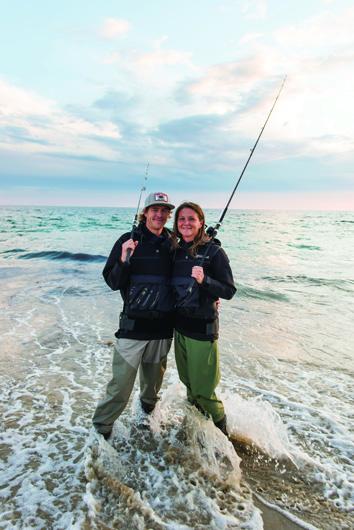
-Albert O. Fischer
Men, Women, and Bass
The wind was blowing out of the southwest pretty hard and Jena Beauregard was worn out. She’d been feeling sick for a few days, most likely from trying to keep pace with Julian Pepper, her boyfriend of several years. The thirty-four-year old Julian has worked at Larry’s Tackle Shop in Edgartown since he was a teenager, through four different owners. He’s been entering big fish in the Martha’s Vineyard Striped Bass and Bluefish Derby even longer, having placed third overall for juniors with a seven-and-a-half pound bonito in his first derby at the age of ten.
When they first started dating, Jena fished a few times during the derby, but wasn’t very involved. Two years ago, however, having learned to tend her own rod, she bought a button of her own. But this particular night she stayed behind in the car to sleep while Julian trudged down a path to the beach. He had been fishing this spot for some time, targeting fish on this certain tide.
Julian chucked his bait into the water and immediately got a hit. He was fishing two rods, catching and releasing fish, waiting for one big enough to bring to weigh-in. He was delighted, therefore, when he caught a striped bass about twenty-seven pounds. He quickly buried it in the dunes, erased his tracks in the sand, and set up the rod again, hoping to get an even bigger fish, because at that time you could keep two fish.
It was about midnight, and Morgan Taylor walked by and asked if anything was going on. Julian told him he had only caught one small bass. Morgan said he got a couple in the teens, but nothing he wanted to keep. When he continued on his way Julian exhaled, and then ran to get Jena to join him. “It’s ON, you have to get up now! The fish are here!” he told her. She looked up, bleary-eyed, and grunted, but made her way down to the beach.
“We’ll fish three rods; you set your rod on the other side of mine,” he instructed. The fish were hitting the bait very lightly and it was difficult to know when a fish had the bait in its mouth. They were missing some of the hits. Julian noticed the tip of the middle rod twitching lightly and told her to grab it. “No, no, I don’t deserve one, I’ll screw it up,” she said. She knew he was working hard to get a big fish and didn’t want to lose it.
“It’s okay. Please, Jena, take that rod!” he yelled. The fish took a run, but then when she set the hook it was gone.
“See, I told you I would screw it up,” she said.
“It’s okay,” he consoled her. “Leave the bait in the water, set the bait runner and another one might take it.” And sure enough, suddenly another fish grabbed the bait and started running. This time she had it. Jena worked the fish down the beach and once it was near the shore, Julian jumped into the surf to grab it. He dragged it up onto the beach and, dripping with salt water, said, “That’s a derby leader! That’s at least a thirty pounder.”
“I feel terrible; that should have been your fish,” said Jena, “I don’t want to weigh it in.” But Julian wasn’t hearing it. Her fish weighed 34.63 pounds and when the derby ended she was the Grand Overall Shore Striped Bass winner for 2013. To add icing on the cake, she drew the key that won the boat. They’re still dating. They’re still fishing. And Julian is still waiting for his turn to catch a derby-winning striper.
-Janet Messineo
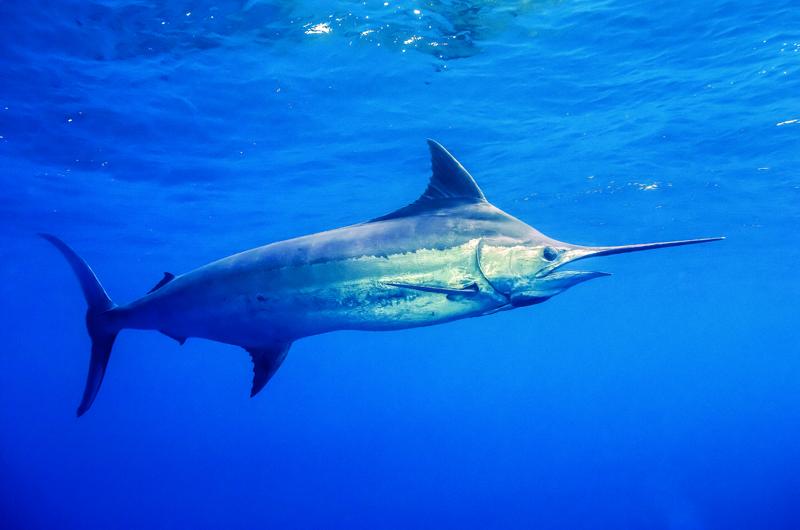
Coop and the Monster from the Deep
About two or three years ago…” Cooper Gilkes started saying one afternoon at Coop’s Bait and Tackle in Edgartown.
“It was about eight years ago, Coop,” Justin Pribanic gently interjected. “I’ve been working here for ten years and it was a couple of years after I first started.”
“Really? Really ten years?”
The two bantered back and forth until Coop finally relented. “Okay, it was about eight years ago…roughly. Donny Benefit wanted to do an offshore tuna trip. Now, there is one thing you need to understand about going with Captain Donny – you better be on time! You never, ever, ever can be one minute late. You will watch him steaming off of the dock and he will never turn around to come back to get you.”
Benefit, Coop, and Pribanic were joined by Edgartown shellfisherman Petie Jackson, making a total crew of four that headed for the Canyons, a legendary fishing ground south of the Vineyard. “We were about eighty or ninety miles out and we started trolling and picked up some nice yellowfin tuna,” he recalled. “Now it was dark and we wanted some swordfish. We fished all night, but no swords.”
The next morning Coop was sound asleep in the chair facing the rods when “all of a sudden, one of the rods opens up and wakes me up like an alarm clock. I open my eyes and see Justin in the back of the boat. He was the only one awake and the first one to hear the reel go off. All we saw was a hole in the water that looked like someone dropped a VW bus behind the boat.”
Coop told Justin to grab the rod, but he refused. “The night before, another boat got a bigeye tuna,” he explained. “That’s an important fish and means big money and I didn’t want to screw up my first trip with Donny. If I lost the fish, he’d have freaked.”
So Coop grabbed the rod and the battle began. The fish stayed deep and never jumped, so he had no idea what he was fighting. One minute the fish would be coming toward the boat and Coop would crank like mad to get the line on the reel. A second later it was running away and stripping the line back off of the spool again. Justin and Petie stood nearby cheering him on and pouring bottles of water on both the reel and Coop to keep them cool. Meanwhile, Donny ran the boat back and forth, trying to keep up with the fish or keep line tight on the reel. “I knew this fish was fighting like nothing I had ever caught before,” Coop said.
“Most people would have passed the rod off,” added Justin. “It was impressive.”
As the sun rose higher in the sky and fatigue was beginning to set in, Coop finally caught sight of a fin. “It didn’t look that big. It was only about ten inches high above the surface of the water.” Then he saw another fin, about twelve feet away from the first one. Maybe it’s another fish, he thought to himself. “This can’t be one fish.”
But it was. “Marlin!” screamed Justin. Coop still wasn’t sure; after all, marlin typically jump. “This thing was enormous, it slides through the water like a submarine,” he recalled. Finally, after a two-and-a-half-hour fight, the fish was twenty-five yards behind the boat. “My shoulders were gone and my legs were aching. I was giving it everything I had and I could not budge it.”
Justin grabbed the wire and pulled it close to the boat as Petie picked up the harpoon and got ready to strike the fish. But the crew was divided about whether to kill the giant. Donny wasn’t sure they should be wasting time catching a fish they couldn’t legally sell. Coop and Justin thought it was too beautiful to be killed.
When they got the fish to the side of the boat, Donny, who was still at the helm, told Petie, who had gloves on, to grab the fish’s bill. Coop estimates it was about twelve inches in circumference. “I’m not touching that fricken thing,” Petie yelled back.
“Give me the gloves,” said Justin, who was in the perfect position. Everyone was tired and he just wanted to get the hook out and release the fish safely.
“Grab the horn,” Donny repeated.
Justin probably weighed one hundred and thirty-five pounds soaking wet at that time, and when he took hold of the bill, the marlin shook its head and sent him flying up in the air. Coop grabbed him so he wouldn’t fall overboard.
“FORGET IT!” Coop hollered. “I yelled, ‘get away from that thing.’ I didn’t want him to get hurt. If the fish ever jumped, the bill would have gone right through Justin.”
The giant fish, which was fourteen feet, six inches long, was now spent and laying by the side of the boat. “I tell you, this thing was so, so beautiful. It had cobalt blue stripes on its sides,” Coop remembered. “The bars on a marlin are incredible. Unbelievable cobalt blue. You can’t even imagine the color unless you see it. I never caught one before and never will again. It was massive.” Coop stretched his arms out as far as he could to show me that he still would not be able to get them around half of the girth. Justin remembers looking into its eye, as large around as a cantaloupe.
While Coop and Justin were in the stern talking about releasing the fish, Petie and Donny were in the front of the boat discussing keeping it. Donny had come around to thinking they might as well keep it. And it was Donny’s boat.
“You’re not really going to kill this fish are you? REALLY?”, Coop finally asked.
“Let it go!”, Donny screamed back.
“Donny was pissed off realizing they wasted almost three hours when they could have been tuna fishing,” explained Coop. “He didn’t talk to me for over an hour.”
The story doesn’t quite end there, however. “We get back home, Donny goes over to the fish market and what does he see for sale? Marlin! He comes over to the shop and I thought the door was going to come off the hinges.”
“They’re selling blue marlin over there!”, Donny screamed.
“That is not American blue marlin,” Coop struggled to explain. “That’s from South America.” Finally convinced, Donny relaxed, and the two men remain good friends with a great fish to remember.
-Janet Messineo
Ed and the Wrong Striper
One night I was fishing on the end of West Chop jetty. There was a small crescent moon, but it was one of those very dark nights and, as usual, I was alone. I was startled by a noise behind me and turned to see a skunk waddling down the jetty, heading right for me.
I was trapped! I looked in my bait bucket and said to myself, “That must be what he wants!” I threw my squid at him, but he kept coming. He held me hostage on the last rock before the ocean, and no matter how much noise I made, I could not shoo him away. Jumping into the cold, black water crashing at my feet was not an option.
Finally he left me room to pass, and I grabbed my gear and ran down the jetty and didn’t stop until I got to my car. I arrived home, grateful that I smelled no worse than the squid on my hands.
That was a close call, but Ed Lepore has me beat. He’d tied freshwater flies since high school, but when he retired to the Vineyard in 1988 he became interested in saltwater fly-fishing. He was fishing at Lobsterville one night when he got stuck on something on his back cast. It is not unusual to hook some weeds or a branch, but this was moving! He turned around and through the darkness, he could make out a shadow walking along the white sand of the dune, a shadow with a white stripe down its back. He’d hooked a skunk.
He tried to recover as much of his fly line as he safely could, then gave a good tug, and luckily the skunk came loose and ran away. He’s been selling his expert flies in the local tackle shops, and now offers a black deceiver. It’s name? The Skunk Fly.
– Janet Messineo

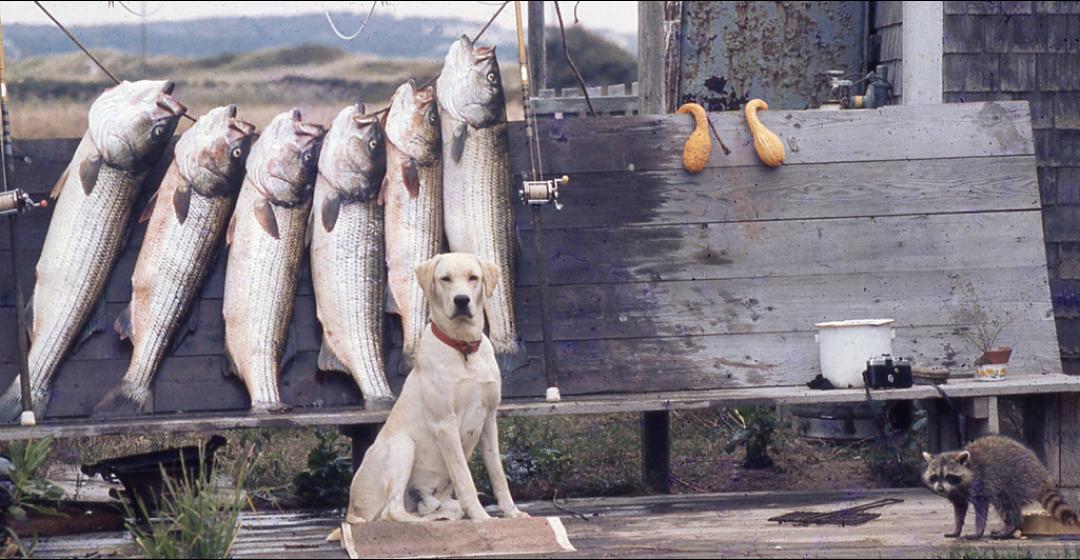


 2 comments
2 comments
Comments (2)